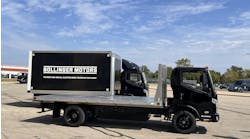Navistar has revealed the results of the International SuperTruck II, a project in partnership with the U.S. Department of Energy (DOE). International SuperTruck II demonstrates 16 miles-per-gallon fuel efficiency through hybridization and a 170% improvement in freight efficiency, among other advancements over the previous International SuperTruck I. It does so utilizing technical approaches to weight reduction from rolling resistance technologies, aerodynamic improvements, and powertrain technologies, according to a Navistar press release.
"With co-funding by the DOE, Navistar engineers experimented with prospective technologies not currently available in the Class 8 truck market to accelerate the impact of sustainable mobility," said Russ Zukouski, chief engineer of global innovation and principal investigator for the Supertruck programs. "The team concentrated its design on high-voltage electrification, utilizing hybrid technology on a path toward full electrification that has the potential to be commercialized in fully electric vehicles and improve customers' total cost of ownership (TCO) and business operations."
Navistar reported that its International SuperTruck II, through hybridization and aerodynamic technology, improved vehicle freight efficiency by 170%, and engine brake thermal efficiency reached 55%. The company assessed TCO opportunities for individual technologies and high-voltage electrification efforts modeling hybrid technologies that can be used for fully electric vehicles.
"Navistar is the only OEM to build a trailer to provide the most accurate testing results possible," said Dean Oppermann, chief engineer of advanced truck. "It includes a 100% composite box designed for minimum aerodynamic drag with light weight, integrated cross members, controlled underbody flow with composite aero treatments, next-generation solar panels with connectivity options, and ride height control."
Developed in partnership with Bosch, the International SuperTruck II is a hybrid vehicle featuring a combustion engine with high-voltage accessories and technologies. Combustion, friction, gas exchange, and airflow through the engine were among the critical areas in which improvements were made. A redesigned cylinder head with dual overhead cam engine and enhanced fuel system resulted in a 2% fuel economy improvement when compared to International SuperTruck I, the company reported. Aftertreatment system improvements included diesel exhaust fluid (DEF) dosing, improved mixing, new selective catalytic reduction (SCR) formulations for high-NOx reduction, and reduced cold-start activation time.
"A full-system approach was required to achieve 55.2% brake thermal efficiency," said Jim Cigler, chief engineer, advanced engine. "Opportunities were identified by internal engineering teams along with research partner Argonne National Laboratory through detailed analysis and simulation. System suppliers such as Bosch, Jacobs Vehicle Systems, and Applied Nano Systems (ANS) brought new approaches to key systems that enabled laboratory success and yielded real-world fuel economy improvements. Navistar was able to identify new ways to push our engines to the next level of efficiency."



